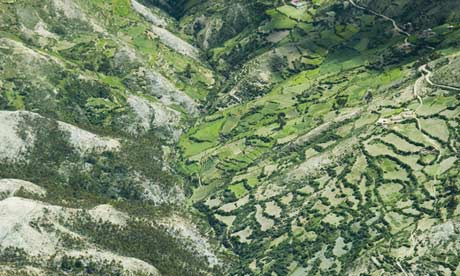 Indigenous people in Peru have suffered "devastating consequences" as a result of extractive industries in the Amazon rainforest, according to the United Nations' Special Rapporteur on Indigenous Rights.
Indigenous people in Peru have suffered "devastating consequences" as a result of extractive industries in the Amazon rainforest, according to the United Nations' Special Rapporteur on Indigenous Rights.
During a week-long trip to the country, James Anaya visited indigenous communities in Loreto, an Amazon region which has been heavily contaminated over the last 40 years by oil companies. In particular he visited an oil concession known as Block 192 (formerly Block 1AB).
Oil industry 'devastating' for Amazon communities, warns UN
UN says 'e-waste' problem growing fast
 The mountain of refrigerators, cellphones, TV sets and other electrical waste disposed of annually worldwide is forecast to grow by a third by 2017, mostly in developing nations, according to a U.N. study released Sunday.
The mountain of refrigerators, cellphones, TV sets and other electrical waste disposed of annually worldwide is forecast to grow by a third by 2017, mostly in developing nations, according to a U.N. study released Sunday.
E-waste — defined as anything with a battery or a cord — can pose a big problem because it often contains substances that are harmful to humans and the environment if not properly disposed of. On the other hand, some of it can be profitably recycled.
NOAA: Arctic sea-ice melt linked to extreme summer weather
 A growing body of evidence demonstrates a link between the melting of Arctic sea ice and worsening summer heat waves and other extreme weather in the United States and elsewhere in the world, leading scientists said Thursday.
A growing body of evidence demonstrates a link between the melting of Arctic sea ice and worsening summer heat waves and other extreme weather in the United States and elsewhere in the world, leading scientists said Thursday.
“The Arctic is not like Vegas. What happens in the Arctic does not stay in the Arctic,” said Howard Epstein, a University of Virginia environmental scientist who’s part of a team that produced the Arctic Report Card for the federal National Oceanic and Atmospheric Administration.
U.S. drilling boom leaves some homeowners in a big hole
 The United States has a long history of keeping industrial activity out of middle and upper-middle-class residential neighborhoods. But that is starting to change with the spread of new technology for oil and gas drilling, such as horizontal drilling and hydraulic fracturing, or "fracking."
The United States has a long history of keeping industrial activity out of middle and upper-middle-class residential neighborhoods. But that is starting to change with the spread of new technology for oil and gas drilling, such as horizontal drilling and hydraulic fracturing, or "fracking."
The new techniques have allowed once-unreachable reservoirs of energy, trapped beneath the forested suburbs and bustling urban centers of places like Los Angeles, Denver and Cleveland, to be pumped out for the first time. As a result, millions of American homeowners now find themselves living within a mile of drilling activity that they say is deflating the value of their homes, making it hard for them to move.
Fire Triggers Shutdown of Arkansas Nuclear Reactor
A nuclear reactor at Entergy Corp.'s ETR -0.97% Arkansas One power plant shut itself off on Monday morning after a fire broke out at a nearby electrical switchyard.
The incident involved the plant's Unit 2 reactor. The Unit 1 reactor remained in service, furnishing electricity to the power grid, Entergy said.
There was no radiation release, according to Victor Dricks, a spokesman for the Nuclear Regulatory Commission. Mr. Dricks said an NRC inspector assigned to the site was in the control room, monitoring Entergy's actions.
First Gulf oil spill natural resource study reveals extensive damage in shoreline, deepwater habitats
The extensive damage caused by the BP Deepwater Horizon oil spill and the ensuing cleanup efforts to natural resources along the shoreline and in deepwater habitats of the Gulf of Mexico were outlined for the first time Friday (Dec. 6) in a comprehensive environmental assessment.
The assessment, released by federal and state oil spill trustees, accompanies a plan for spending $627 million on 44 projects aimed at restoring some of the damage outlined in the report, or compensating the public for lost resources. That plan is the third batch of projects to be paid for with $1 billion set aside in 2011 by BP to build "early restoration" projects under the Natural Resource Damage Assessment process required by the federal Oil Pollution Act of 1990.
Oklahoma Earthquake Surge Prompts New California-Style Precautions
 From 1975 to 2008, only a handful of magnitude-3.0 earthquakes or greater occurred yearly in Oklahoma. But the average grew to around 40 annual earthquakes from 2009 to 2013, seismologists said in the report on the uptick of quake activity.
From 1975 to 2008, only a handful of magnitude-3.0 earthquakes or greater occurred yearly in Oklahoma. But the average grew to around 40 annual earthquakes from 2009 to 2013, seismologists said in the report on the uptick of quake activity.
Since 2009, more than 200 magnitude-3.0 or greater earthquakes have hit the state's midsection, according to the Geological Survey. Many have been centered near Oklahoma City, the most populous part of the state.
More Articles...
Page 53 of 201

 Environmental Glance
Environmental Glance






























